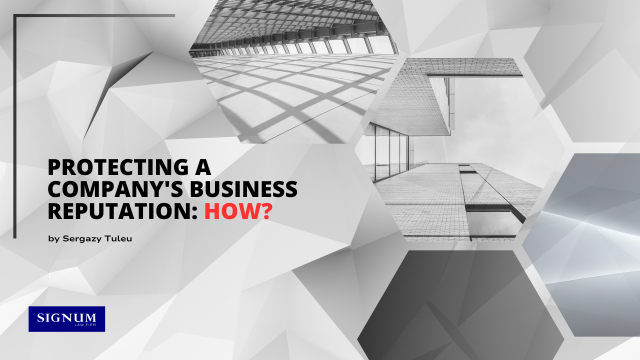Protecting a company’s business reputation: how?
August 18, 2023
Business reputation is crucial for any business, and there are instances where a company might encounter the dissemination of defamatory information that may not align with reality. The success of legal entities depends on their business reputation. Hence, it's essential to counter unreliable information and regain the company's business reputation.
According to paragraph 3 of Article 115 of the Civil Code[1] of the Republic of Kazakhstan (hereinafter – the «Civil Code»), business reputation is considered a subject of non-property rights and, accordingly, is eligible for protection, similar to property rights.
Instructions for the protection of business reputation.
To begin with, the company needs to confirm the presence of three conditions regarding the information: the information must be explicitly defamatory, it must have been disseminated, and it must be untrue. Secondly, the company should document the act of dissemination of information with the help of a notary. Thirdly, the company should identify the disseminator. This could be the media’s editor-in-chief, or an individual who posted the information on his/her social network account, etc. It is important to note that citizens' appeal to state authorities regarding the company will not be considered as information dissemination. For instance, if citizens make an official complain to the state authorities and report your suspicions or requested an investigation into certain facts about the company.
The protection of the business reputation of a legal entity is carried out under Article 143 of the Civil Code. The provisions of this article contain rules for the protection of honor, dignity of an individual or legal entity.
In what sources can misleading information be disseminated?
Misleading information may be disseminated in the following sources: Media, social networks, documents originating from the organization, information across the Internet, or on specifically created websites as testimonials.
How to regain the business reputation?
First of all, it’s essential to address the individual who disseminated this defamatory information. A legal entity can submit a specific request to refute the defamatory information using the same means of dissemination, or a similar approach, unless the disseminator can prove its accuracy. Moreover, if the defamatory information was published in the media, along with the refutation, the affected party has the right to publish their response in the same media free of charge, maintaining the similar format, font, newspaper layout, and color. This phase is a mandatory pre-trial dispute resolution procedure, and failure to adhere to it could lead to the court’s rejection of the claim.
Legal action
One can file a lawsuit for refuting information and/or compensation for damages caused by unlawful actions.
In cases where identifying the individual who disseminated information defaming a legal entity’s business reputation, the company that is subject to such disseminated information is entitled to bring a court action requesting that the disseminated information does not correspond with reality.
How to win in court?
As previously mentioned, if the company discovers a negative and misleading publication, the first step is to document it. Next, the requirements should be determined. The company is advised to use defense methods such as:
· recognizing the information as misleading and (or) defamatory;
· mandating the removal of the information;
· retracting any document containing such information;
· seeking compensation for damage to the company's business reputation;
· pursuing the recovery of losses.
Additionally, in court, the company will need to prove the existence of an already established reputation. For example, you can substantiate the positive assessment of the company by providing letters of recommendation from counterparties.
Evidence
The disseminator of misleading information is obligated to prove or disprove his/her statement, i.e. the burden of proof rests on the defendant himself.
According to paragraph 8 of the Normative Resolution[2] of the Supreme Court of the Republic of Kazakhstan «on the application of legislation on the protection of the honor, dignity and business reputation of individuals and legal entities in judicial practice», pursuant to paragraph 3 of Article 141 and paragraph 1 of Article 143 of the Civil Code of the Republic of Kazakhstan, the burden of proof that the disseminated information corresponds to reality rests with the defendant. The plaintiff is only required to prove the fact of dissemination of defamatory information by the person against whom the claim is brought.
However, the Plaintiff still needs to carry out significant work in gathering information when preparing the claim, substantiating the damage caused to the business reputation (for example, through the testimony of a linguistic expert), and, if necessary, justifying the extent of the damage, which can be quite challenging.
The Plaintiff needs to demonstrate that its reputation has been undermined, and client confidence has been lost (or could potentially be lost), or other adverse consequences for the company have arisen (e.g. contract termination with clients, financial losses, etc.). Here it is necessary to prepare detailed calculations, for example, if a permanent counterparty refused to conclude a contract exactly after the publication of defamatory information, the company can present the court with documents proving that the company earned more during a similar period the previous year, in order to establish the extent of the damage.
The Defendant must substantiate the fact that the information they disseminated corresponds to reality, as well as demonstrate the absence of any harm to the Plaintiff.
Court practice
Analysis of court practice has revealed ambiguous court decisions on the protection of business reputation. Having analyzed court decisions in recent years, it is essential to note that courts satisfy only half of all claims for protection of business reputation. It is also worth noting that some cases conclude with out-of-court settlements approved by the courts.
Information contained in this Client Update is of general nature and cannot be used as legal advice or recommendation. Please note that Kazakhstan is an emerging economy, and its legislation and legal system are in constant development. Should you have any questions or want to discuss matters addressed in this Client Update, please contact us.

- Civil Code of the Republic of Kazakhstan No. 268-XIII dated 27 December 1994.
- Normative Resolution of the Supreme Court of the Republic of Kazakhstan «On Application of Legislation on Protection of the Honor, Dignity and Business Reputation of Individuals and Legal Entities in Judicial Practice » No. 6 dated 18 December 1992.

